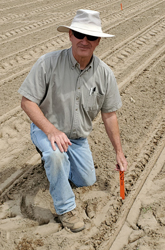 Steve M. Brown is a 1978 graduate in agronomy and soils from Auburn University and later earned MS and PhD degrees in agronomy/weed science at Auburn and Texas A&M, respectively. He worked as an assistant county agent in a cotton pest management role for a couple of years in northern Alabama and then served as a research associate in a Cotton Incorporated-funded project on no-till cotton from 1980 to 1984. From 1987 until 2008, he served as an Extension weed scientist and cotton agronomist for the University of Georgia in Tifton. He worked for a major seed and biotechnology company from 2008 until 2019, when he joined the faculty at Auburn. His entire career has focused on cotton.
Steve M. Brown is a 1978 graduate in agronomy and soils from Auburn University and later earned MS and PhD degrees in agronomy/weed science at Auburn and Texas A&M, respectively. He worked as an assistant county agent in a cotton pest management role for a couple of years in northern Alabama and then served as a research associate in a Cotton Incorporated-funded project on no-till cotton from 1980 to 1984. From 1987 until 2008, he served as an Extension weed scientist and cotton agronomist for the University of Georgia in Tifton. He worked for a major seed and biotechnology company from 2008 until 2019, when he joined the faculty at Auburn. His entire career has focused on cotton.
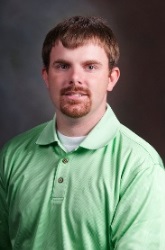 Hunter Frame has been the field crops agronomist at Virginia Tech’s Tidewater Agricultural Research and Extension Center since 2012. In this role, he serves as Virginia’s cotton specialist and manages the Official Cotton Variety Testing program; the bulk of his research is focused on soil fertility and plant nutrition issues in cotton production. Projects in Dr. Frame’s research program have focused on nitrogen, sulfur, potassium, and micronutrients. Understanding how cotton yields can be improved through managing nutrients and other agronomic inputs is paramount to enhancing the profitability and sustainability of U.S. cotton producers. This is the overarching goal of Dr. Frame’s research and Extension program.
Hunter Frame has been the field crops agronomist at Virginia Tech’s Tidewater Agricultural Research and Extension Center since 2012. In this role, he serves as Virginia’s cotton specialist and manages the Official Cotton Variety Testing program; the bulk of his research is focused on soil fertility and plant nutrition issues in cotton production. Projects in Dr. Frame’s research program have focused on nitrogen, sulfur, potassium, and micronutrients. Understanding how cotton yields can be improved through managing nutrients and other agronomic inputs is paramount to enhancing the profitability and sustainability of U.S. cotton producers. This is the overarching goal of Dr. Frame’s research and Extension program.
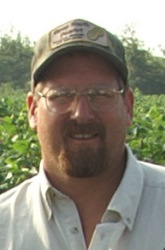 Glen Harris was born and raised in southern New Jersey, where he worked on vegetable and cut flower farms on Coastal Plain soils. After receiving a BS in horticulture from Penn State University and MS and PhD degrees from Michigan State University in crop and soil sciences, he was hired by The University of Georgia in March of 1994 as an agronomist for soils and fertilizers. Located in Tifton, Georgia, on the UGA Tifton Campus, his responsibilities include Extension, applied research, and teaching in the area of soil fertility for all agronomic crops. The focus of his programs is fertilizer management for cotton, peanut, and corn. This also includes the management of animal manure such as poultry litter and numerous by-products such as fertilizers, liming materials, and soil amendments. The emphasis of Dr. Harris's applied research program in recent years has been the evaluation of enhanced efficiency fertilizers such as urease and nitrification inhibitors, potassium fertilization of cotton, and calcium nutrition for peanut.
Glen Harris was born and raised in southern New Jersey, where he worked on vegetable and cut flower farms on Coastal Plain soils. After receiving a BS in horticulture from Penn State University and MS and PhD degrees from Michigan State University in crop and soil sciences, he was hired by The University of Georgia in March of 1994 as an agronomist for soils and fertilizers. Located in Tifton, Georgia, on the UGA Tifton Campus, his responsibilities include Extension, applied research, and teaching in the area of soil fertility for all agronomic crops. The focus of his programs is fertilizer management for cotton, peanut, and corn. This also includes the management of animal manure such as poultry litter and numerous by-products such as fertilizers, liming materials, and soil amendments. The emphasis of Dr. Harris's applied research program in recent years has been the evaluation of enhanced efficiency fertilizers such as urease and nitrification inhibitors, potassium fertilization of cotton, and calcium nutrition for peanut.
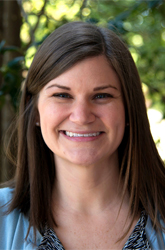 Audrey Gamble is an assistant professor in the Department of Crop, Soil, and Environmental Sciences at Auburn University and an Extension soil scientist for the Alabama Cooperative Extension System. She received a PhD in soil chemistry from the University of Delaware and an MS degree in agronomy and soils from Auburn University. Her research and Extension programming focuses on 1) providing soil fertility recommendations for major row crops, including cotton, corn, peanuts, and soybean, and 2) evaluating soil conservation practices (cover cropping and conservation tillage) in row crop production systems.
Audrey Gamble is an assistant professor in the Department of Crop, Soil, and Environmental Sciences at Auburn University and an Extension soil scientist for the Alabama Cooperative Extension System. She received a PhD in soil chemistry from the University of Delaware and an MS degree in agronomy and soils from Auburn University. Her research and Extension programming focuses on 1) providing soil fertility recommendations for major row crops, including cotton, corn, peanuts, and soybean, and 2) evaluating soil conservation practices (cover cropping and conservation tillage) in row crop production systems.
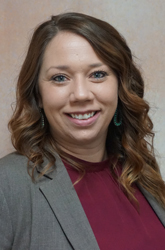 Katie L. Lewis is an agricultural and environmental soil scientist and continually striving to enhance her understanding of the critical challenges currently facing agriculture and society. As the daughter of a South Texas farmer (Taft, San Patricio County), she was introduced at a young age to these challenges of sustainable agriculture and how they affect society. Dr. Lewis considers soil to be one of our most valuable natural resources, with the ability to produce food, feed and fiber, recycle wastes, filter and break down contaminants, and sequester carbon. As an assistant professor of soil chemistry and fertility at Texas A&M AgriLife Research and Texas Tech University, Dr. Lewis is provided the opportunity through research and service to enhance the agricultural sustainability of the Texas High Plains region that is vitally important to both Texas and the nation, while helping educate future scientists, farmers, society, and policy-makers. Dr. Lewis received her BS in chemistry from Sam Houston State University in 2008. She received her MS and PhD in 2010 and 2014, respectively, from Texas A&M University. With a joint appointment at Texas A&M AgriLife Research in Lubbock (75% research) and Texas Tech University (25% teaching), Dr. Lewis is deeply engaged in research, teaching and service.
Katie L. Lewis is an agricultural and environmental soil scientist and continually striving to enhance her understanding of the critical challenges currently facing agriculture and society. As the daughter of a South Texas farmer (Taft, San Patricio County), she was introduced at a young age to these challenges of sustainable agriculture and how they affect society. Dr. Lewis considers soil to be one of our most valuable natural resources, with the ability to produce food, feed and fiber, recycle wastes, filter and break down contaminants, and sequester carbon. As an assistant professor of soil chemistry and fertility at Texas A&M AgriLife Research and Texas Tech University, Dr. Lewis is provided the opportunity through research and service to enhance the agricultural sustainability of the Texas High Plains region that is vitally important to both Texas and the nation, while helping educate future scientists, farmers, society, and policy-makers. Dr. Lewis received her BS in chemistry from Sam Houston State University in 2008. She received her MS and PhD in 2010 and 2014, respectively, from Texas A&M University. With a joint appointment at Texas A&M AgriLife Research in Lubbock (75% research) and Texas Tech University (25% teaching), Dr. Lewis is deeply engaged in research, teaching and service.
